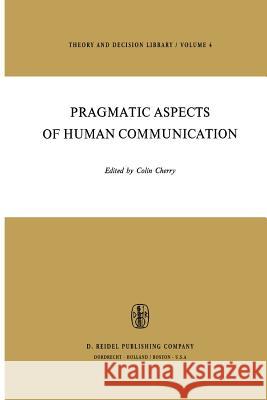Pragmatic Aspects of Human Communication » książka
Pragmatic Aspects of Human Communication
ISBN-13: 9789027705204 / Angielski / Miękka / 1974 / 179 str.
'Human Communication' is a field of interest of enormous breadth, being one which has concerned students of many different disciplines. It spans the imagined 'gap' between the 'arts' and the 'sciences', but it forms no unified academic subject. There is no commonly accepted terminology to cover aU aspects. The eight articles comprising this book have been chosen to illustrate something of the diversity yet, at the same time, to be comprehensible to readers from different academic disciplines. They cannot pretend to cover the whole field Some attempt has been made to present them in an order which represents a continuity of theme, though this is merely an opinion. Most publications of this type form the proceedings of some sympo sium, or conference. In this case, however, there has been no such unifying influence, no collaboration, no discussions. The authors have been drawn from a number of different countries. The first article, by John Marshall and Roger Wales (Great Britain) concerns the pragmatic values of communication, starting by considering bird-song and passing to the infinitely more complex 'meaningful' values of human language and pictures. The 'pragmatic aspect' means the usefulness - what does language or bird song do for humans and birds? What adaptation or survival values does it have? These questions are then considered in relation to brain specialisation for representation of experience and cognition."











